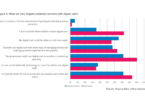On Tuesday, Federal Reserve Governor Michelle Bowman delivered a speech about central bank digital currency (CBDC). The Governor is generally supportive of a wholesale digital dollar. However, she believes that the tradeoffs between benefits and unintended consequences of retail CBDCs make it hard to justify direct access beyond interbank uses.
In her speech, Ms. Bowman addressed two major questions: what problem could a CBDC solve, and what features should be considered in its design and adoption? The Governor touched on various policy objectives and discussed some of the unintended consequences of CBDCs.
Limitations of a retail CBDC
The first shortcoming she observed was the promise to make payment systems more efficient. CBDCs present new opportunities to increase the speed of retail payments and reduce friction, but Governor. Bowman argues that their relative benefits depend on existing payment infrastructures. In the US, for example, the soon-to-launch FedNow service will allow customers to send and receive payments in real-time, so there would be little need for a CBDC.
Similarly, proponents of a retail digital dollar have argued that it could help improve financial inclusion. However, the Governor notes that in the US, more than 95% of households have access to a checking or savings account, and three-quarters of the remaining 4.5% have no interest in getting one. Policymakers should therefore consider other means to improve financial inclusion.
Lastly, Ms. Bowman criticized the idea of using CBDCs to simplify cross-border payments since digital dollars would encounter the same frictions and compliance requirements as current means of payment. “While cross-border payments are among the slowest and least efficient, they also raise substantial legal and regulatory compliance concerns that would apply equally to CBDCs,” she noted.
Design features and unintended consequences
The Governor referred to some familiar challenges in the design of CBDCs that could result in unintended consequences.
For example, like many US Republicans, Ms. Bowman has expressed concerns about the threats to financial privacy, arguing that CBDCs could provide “not only a window into, but potentially an impediment to, the freedom Americans enjoy in choosing how money and resources are used and invested.” She believes existing consumer data protections must continue to be embedded into future payment systems. She also warns of the risks of cannibalizing the banking system and undermining banks’ role in the transmission of monetary policy.
Stick to the wholesale CBDC option
Overall, Ms. Bowman believes that these challenges would be easier to address in the case of a wholesale CBDC, where the digital dollar would be restricted to financial institutions to conduct interbank transactions.
She suggests one possible way to enable a retail digital currency would be to focus on a foundational wholesale layer on top of which banks could directly offer retail digital currencies providing programmability. This is the approach that Brazil is taking.






